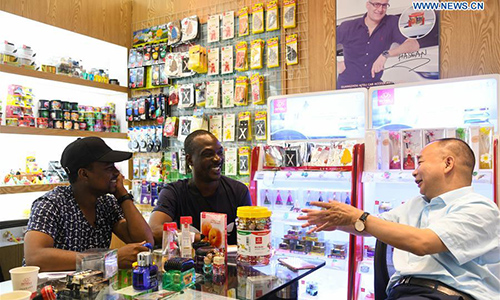‘No discrimination’ against Africans amid pandemic
By Leng Shumei and Chen Qingqing Source:Global Times Published: 2020/4/14 0:48:40

Mansur Barhama Abulfathi (L) from Nigeria translates for his friend at a company in Guangzhou, south China's Guangdong Province. Photo: Xinhua
The controversy over suspected maltreatment and discrimination against Africans in Guangzhou has made headlines on Chinese social media platforms and caused many Chinese authorities, including the Guangzhou government, China's Foreign Ministry and Chinese embassies in African countries, to respond, reiterating China's firm stance to equally treat foreigners and domestic residents.
China's Assistant Foreign Minister Chen Xiaodong met with ambassadors or representatives from more than 20 African countries in China on Monday. He discussed China's stance and efforts in detail, reiterating China's friendly policies toward Africans.
In terms of China's policies on international arrivals amid controversy over management of Africans in Guangzhou, South China's Guangdong Province, with reports alleging discrimination against Africans, Chen said that Guangdong, as an open province, faces a huge risk of imported cases. Only strict management and plugging all loopholes can the province sustain the hard-earned achievements in the battle against the epidemic. It is a responsible move not only to Chinese people but to foreigners including Africans in Guangdong.
African envoys also stressed that China and Africa are good brothers and partners and issues in Guangzhou can be resolved through communication between the two sides. No external force can damage the good development of relations between China and Africa, they said.
Wang Bin, an official at the National Health Commission (NHC), again stressed that China now requires 14-day quarantine at designated centers for all international arrivals and applies strict management over their close contacts. Guangzhou is applying the same measures as other places across China, she said.
A social worker who helps foreign residents in Guangzhou's Yuexiu district report their special needs to communities, told the Global Times on Monday that "there's no such discrimination against the African community," he said, who preferred not to be named.
"We collect the special needs of foreign residents, who usually report inconveniences in daily necessities. And then local communities would follow up on food deliveries or the purchase of necessities," he said.
"We haven't seen cases of stigmatizing African people here, who account for the most number of foreign residents in the area," he said, noting that a large part of them undergo self-quarantine at home.
The Guangzhou authority announced on April 6 an upgrade in the risk level of Yuexiu and Baiyun districts from low to medium to enhanced control against the COVID-19.
Five Nigerians living in Kuangquan Street, Yuexiu, were confirmed to have contracted the coronavirus while in quarantine. Four of them had frequently visited a local restaurant called Emma Food. The restaurant's owner, a woman surnamed Zhuang, was confirmed to have contracted the coronavirus on April 2, the Guangzhou authority said.
Guangzhou is a diversified metropolis so it surely is difficult for the government to manage the residents when implementing policies, a teacher surnamed Wang living in Guangzhou told the Global Times on Monday.
Wang, a native from Hubei, a province hit hardest by the COVID-19, said that the strict policies apply to all rather than targeting foreigners as reported.
"I, a Hubei native who has not gone back to Hubei for two years, was stopped by a guard of the school once I forgot to take my campus card. The guard checked my ID and found out that I am from Hubei and he just did not allow me in until I completed filling out documents."
Wang said she was so angry at that time but the move was understandable. "People are not scared of Hubeiers or foreigners, they are just scared of the virus," she noted.
"Chinese and foreigners are equal on this. We should make efforts together for our safety and health," she said.
Detailed management
Wang Bin, the official from the NHC, explained in detail how China is dealing with different categories of international arrivals.
First, confirmed and suspected patients as well as people showing symptoms such as fever will be sent to designated medical institutes for isolation and treatment immediately and receive nucleic acid tests. These people's close contacts will be sent to designated quarantine centers for a 14-day quarantine and will also be sent to medical institutes once they show any symptoms.
Second, international arrivals aside from those mentioned above can receive two nucleic acid tests at their own expense during the 14-day collective quarantine, separately on the third and the fifth day. They can also receive a test for IgM antibodies. If all three tests show negative results, they can leave the quarantine centers after seven days at the collective quarantine venue and stay at home for a further seven-day quarantine.
Third, silent coronavirus carriers confirmed by medical institutes have to complete a 14-day quarantine at designated centers and receive two nucleic acid tests within 24 hours. They can only leave if both tests show negative results.
The Chinese mainland had a total of 867 imported cases as of Sunday. Wang said 70 percent of these cases were discovered during quarantine.